How to Build Topical Authority For SEO (Step-By-Step in 2023)
Georgi Todorov

The term ”topical authority” gets tossed around quite a bit in the SEO community.
But is it just another buzzword, or something that you should work on?
In this article, we will go over what topical authority is, why it’s important, and how you can build it for SEO in 2023.
What is Topical Authority & Why It’s Important
Originally introduced in Google’s Hummingbird update:
Topical authority measures your expertise and authority on a specific topic.
Put simply, it’s Google’s evaluation of your expertise in your niche.
And the stronger your topical authority is, the higher the chance to rank for more competitive keywords.
That means, if you want to rank for keywords with a high keyword difficulty, backlinks may not be enough.
Google’s E-E-A-T Quality Rater Guidelines emphasize the need for topical authority.
Websites must showcase personal experience and expertise on the topic to be considered trustworthy.
The engine takes into consideration how well you have covered the industry and how quality and in-depth the content is.
This is why the goal is to fully cover a topic you want to discuss on your website – and its sub-topics.
As you build topical authority, you will slowly be considered a thought leader in the industry.
In turn, that improves your E-E-A-T. It’s a cycle.
How to Build Topical Authority for SEO (4 Steps)
You can build topical authority from scratch even if your website is new.
There are things you can do internally and externally to build up the authority in your niche.
Just like with On-Page and Off-Page SEO, it’s two practices that collaborate together.
Building Topical Authority Internally
Step #1: Do topical keyword research
Begin by conducting keyword research around your topic.
In this stage, we are not worried about difficulty or how easy it is to rank.
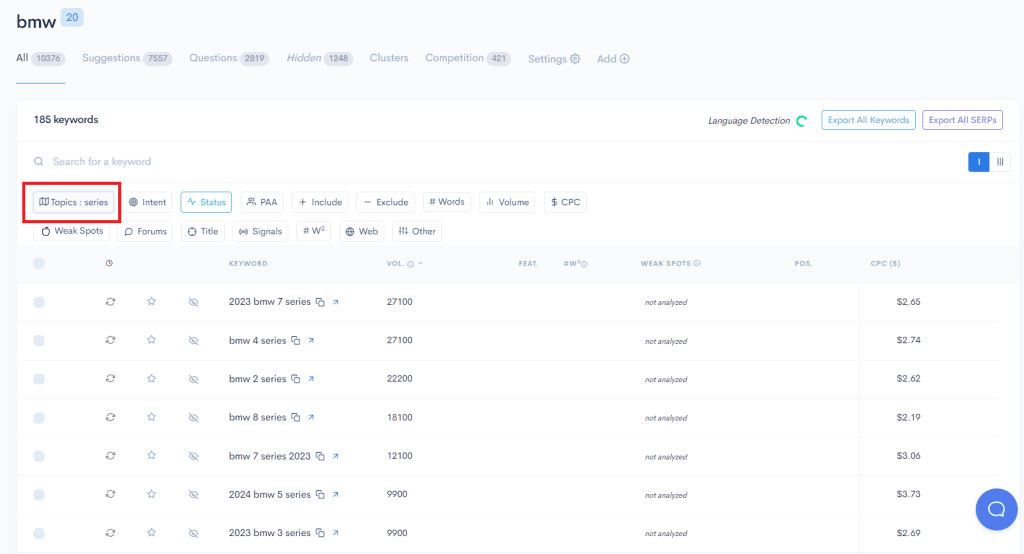
The goal is to see the bigger picture, and LowFruits allows you to filter by the relevant topic that you want to focus on.
In our case, we are a car blog and we are going to do topical research into BMW’s car series.
In this article, we will not deep dive into car keyword research, but you can feel free to read our case study of how niche site owners did topical research.
Step #2: Building topical clusters and a topical map
The next step is to organize your content into topical clusters of pillar content and related sub-topics.
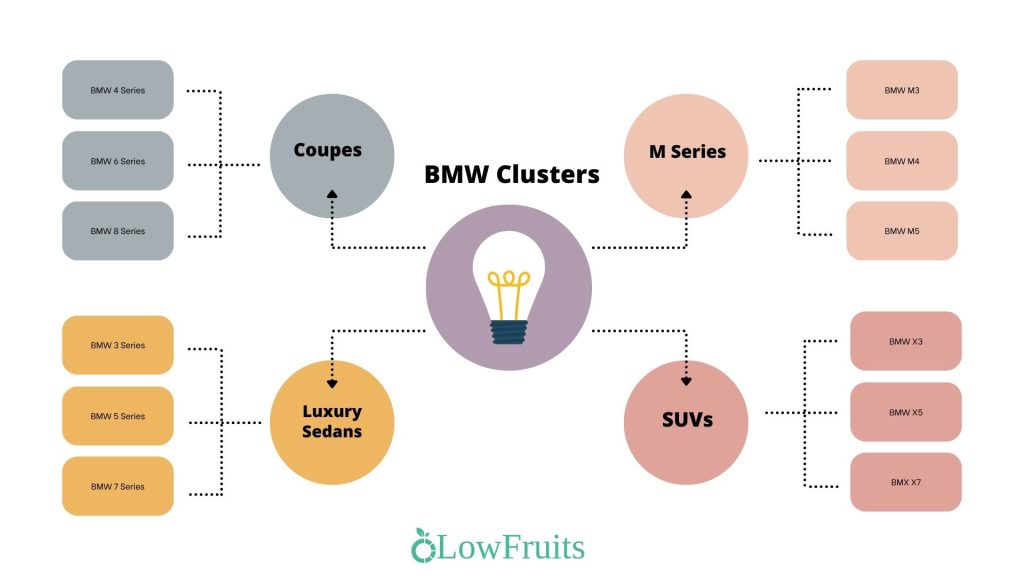
The goal is to find the relevant topical clusters and input seed keywords.
After this, you can then go on to find easy keywords for these niches.
And all that on a bigger topical map so you can see the bigger picture of the niche.
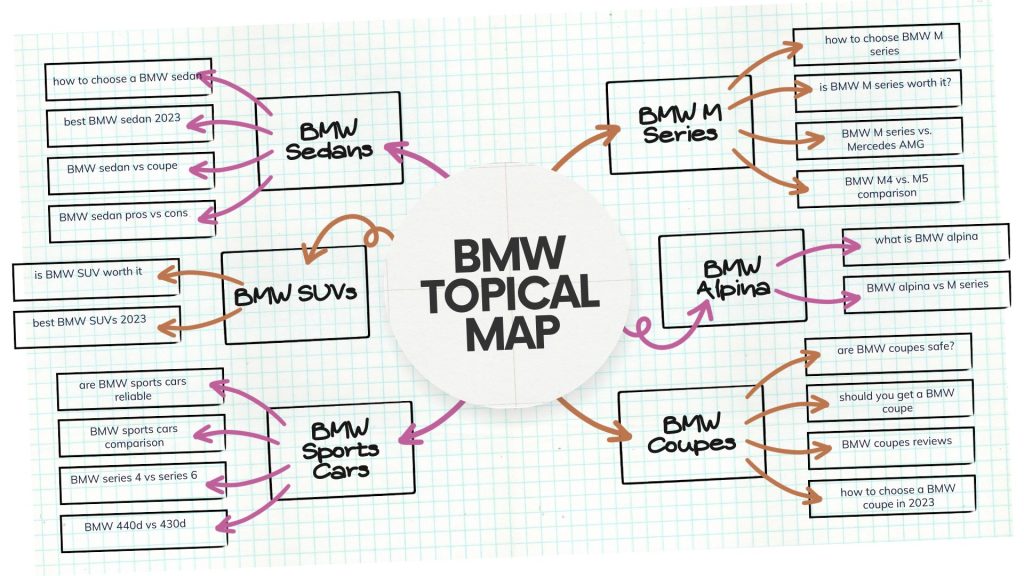
So far so good – but more than a topical map is needed in order to have topical authority.
Simply covering the topics doesn’t cut it if you want to compete with the big players.
Step #3: Publishing quality content – and lots of it
After we have done the keyword research, all that is left is to create optimized content on these keywords.
Publishing velocity and quality matter in our case, as we are trying to write:
- Well-researched content that contains proof and sound arguments
- Content that either adheres to the industry’s best practices or provides a new perspective
- Content that includes supportive imagery, lists, infographics and videos where needed
You also need to show some proof that you are the best person to write about the topic.
Make sure to include your credentials in your author profile at the beginning of the content, and in the introduction.
Provide case studies throughout the content to show that you have done it in the past with success.
Use internal links to connect relevant pages with one another within your website.
You should not internally link every article altogether.
The goal is to provide contextual internal links throughout your content that connect relevant pages within the same cluster.
That’s the primary strategy.
The secondary strategy is to internally link between different topical clusters when they overlap.
Let’s revisit the BMW topical map to see how that works in practice:
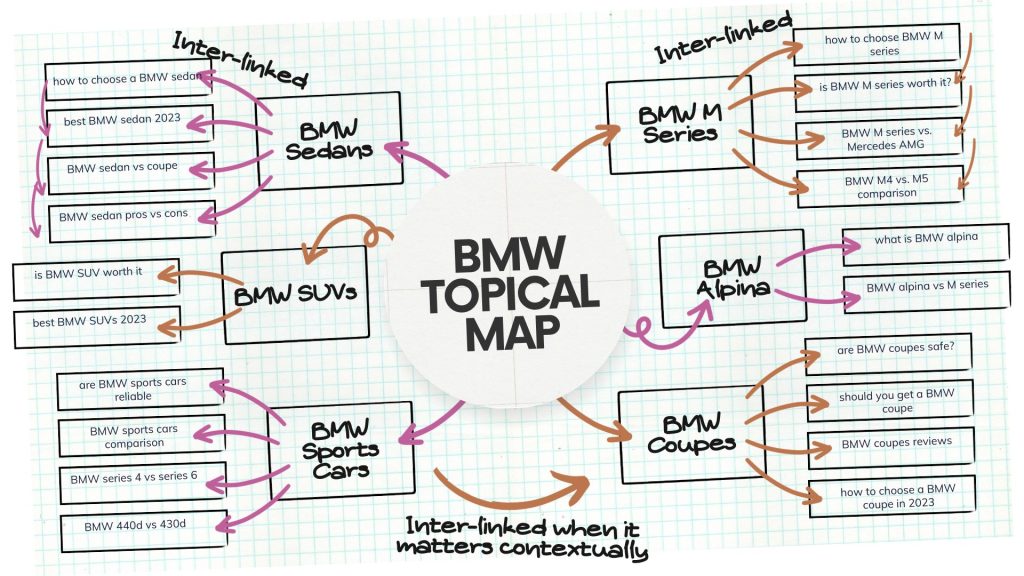
We will interlink the sedan and SUV clusters with one another.
But we will also inter-link sedans to SUVs if there is context to do it, such as an article about ”BMW X5 vs 5 series”.
Building Topical Authority Externally
Contextual Backlinks
Secure contextual backlinks from websites in your niche.
Contextual links are from websites that are topically relevant to your content.
In our case, that would be getting backlinks from other car blogs, ideally who also cover BMW.
To do that, you can:
- Reach out to relevant blogs in your niche and offer guest posts
- Use HARO where you can help reporters talk about your niche in exchange for a link
- Use an agency that specializes in backlinks
2. Multi-Channel Authority
Strive to grow your social media presence so you can get social shares.
Social media doesn’t impact SEO.
But the cross-promotion between your blog and social media can improve your reach and engagement.
3. Reputation Management
Get customer reviews on reputable platforms, such as G2 or Capterra.
The goal is to get brand mentions and to be in a positive light.
4. Produce Non-Article Content
To improve the overall topical authority in your niche, you should design and create:
- E-books
- PDFs
- Courses
And other similar resources that offer massive value to the industry. Backlinks and brand mentions will follow.
How to Measure Topical Authority
Unfortunately, ”topical authority” is not a metric that you can find on an SEO tool.
This is why the best way to evaluate your relative topical authority is to dive into your internal data.
There are 2 ways to approach it, that complement one another.
Approach #1: How each topical cluster ranks on Google
If you are already doing keyword tracking, then you should begin by splitting them into sub-categories, as per your clusters.
And then the average rank would be your rough estimate of how well you are doing in that sub-category.
If you do not have keyword tracking set up in place, then you can do it manually inside Google Search Console.
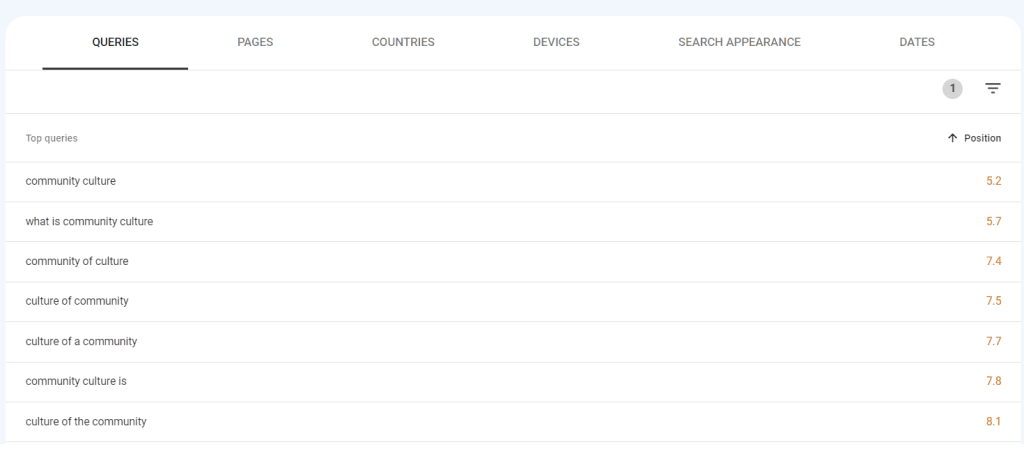
Open your topical map or Excel sheet with the keywords of every cluster, and manually check the rankings of every keyword.
If your clustering is simple, then you’d be able to find all keywords by filtering for a keyword, such as ”culture” in our case.
Sum them together and find the average position.
Approach #2: Relative success with high-competition keywords
Grab Google Search Console and have a look at your rankings for the short-tail keywords.
These will be the keywords that have the highest competition in the industry, and the keywords that everyone is aiming for.
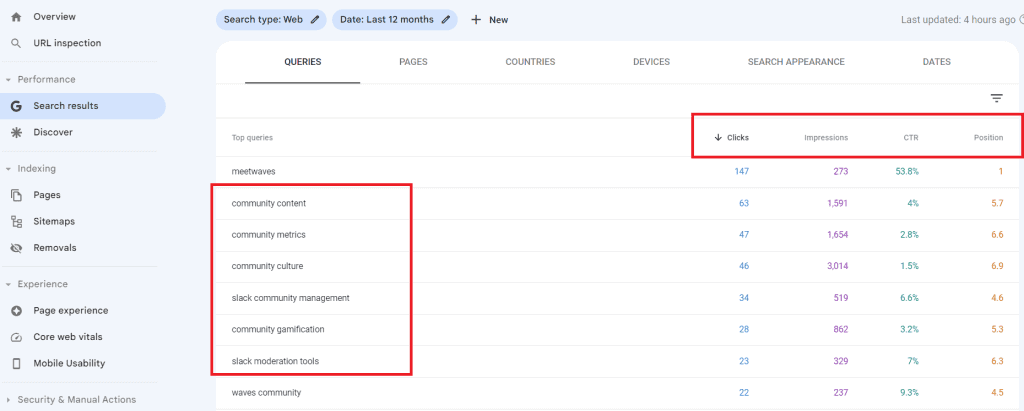
Earlier, we mentioned that topical authority is how much Google trusts you for higher-difficulty keywords.
If we know where Google places us for the most valuable keywords, then we have a rough estimate of how much they trust us.
Final Tips for Building Topical Authority
We covered the main process and the theory of SEO physics.
Here are some bonus tips that you can use to boost your credibility:
1. Consistently meet the search intent
If your content is not meeting the search intent, then it will probably not rank at all.
”Search intent” in this case means what the users are looking for with their query.
If someone is searching for ”BMW 5 series review”, then they wouldn’t expect to see a sales page.
This is why for this keyword we wouldn’t create a sales page, but an article.
2. Provide your POV on the topic
Do not write what everyone else has already written on the topic.
To boost both topical authority and E-E-A-T, provide your point of view on the matter.
It can be your own strategy, or even being contrarian to popular beliefs.
3. Produce a topical site structure
Organize and categorize your content logically.
The goal is to group related content together under similar sub-folders.
For example:
- dot.com/suv/x5
- dot.com/coupe/series-2-coupe
- dot.com/sedan/series-5
It’s both easier for crawlers and users to navigate through such a structure.
4. Spot content gaps from your competitors
Some of your competitors have produced more content than you.
When we want to compete with them, we want to see where are the gaps in our content.
And then to cover it better than them, so we can steal their rankings.
5. Regularly update your content and maintain a posting schedule
Content freshness and publishing velocity matter.
If you want to build topical authority and establish yourself as a thought leader, you will need to:
- Produce plenty of content
- Keep it up-to-date
Conclusion: Building Topical Authority The SEO Way
- Topical authority is a measure of your expertise and authority in your niche.
- The stronger your topical authority is, the more likely you are to rank for higher-difficulty keywords.
- You can build topical authority by fully covering the topic – from A-Z.
- To help yourself see the bigger picture, you can create topical maps and topical clusters.
- To support your A-Z content on the topic, you need to internally link it together.
- There are external factors that could help, such as contextual backlinks and having a social media presence.
- You can measure the topical authority with the rankings of your sub-topics, and how you rank with the short-tail keywords.
- You can further boost your topical authority by meeting the search intent, providing your POV on the topic, and keeping an editorial calendar.